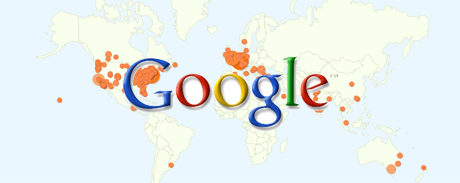How Google Determines the Relevance of a Page
 Have you ever wondered why Google.com delivers different results for a user in the US than for a user in Germany? This is a question I recently had to answer for a client, and it would have been much easier to send him to a link than to spend half an hour trying to explain what many skilled SEOs already know.
Have you ever wondered why Google.com delivers different results for a user in the US than for a user in Germany? This is a question I recently had to answer for a client, and it would have been much easier to send him to a link than to spend half an hour trying to explain what many skilled SEOs already know.
For Web searchers though, the reasons are not so obvious. Of course, they can deduce that Google delivers results based on the geographic location of the searcher, which is determined by the IP address of the user. This is generally true for Google local domains too, like google.de or google.com.au, but, the IP address is not the only factor influencing search results. Also, many webmasters will be lost if this was the only factor determining search results in Google. Knowing some of the following, you will also know why search results vary from location to location, and how to optimize your pages to be relevant for your targeted audience.
- Top level domain name: it’s already common knowledge that TLDs are strongly weighted for local search results by Google. Other TLDs like .info, .tv, .biz are given less authority because of a large number of “spammy” sites with these extensions. TLDs with high authority seem to be .edu, .gov, .org and .mil. The most popular TLD remains .com and although it can be used by sites in any country, it still doesn’t guarantee that the rankings will not fluctuate in the Google SERPs. See below.
- Server location: as I said, .com can be used by anyone, but Google also takes into consideration the geographic location where the domain is hosted. A .com hosted in Australia is seen as an Australian site, whereas a .com hosted in Germany is seen as a German site. So, if you target an American audience for example, and you want to be given priority in the US search results, getting hosting in the US is a good move.

- Location of ITL (incoming text links). If your target is international try to get links from sites hosted in as many different countries as possible. The same is true if you target local audiences, get as many links from sites hosted in the country you target. For example, if most of your links come from Australian sites Google will figure that the site is Australian one, or of interest to Australian searchers.
- Page language: it’s possible to rank for pages you translate in other languages too, even if your site is not hosted in the country whose language you target. In this situation the ranking factors include, aside language, encoding characters, and meta titles and descriptions, which should be translated too.
- Last but not least, take care how you set up your Google Webmaster Tools. When you sign up for this service, Google asks you to set up the geographic location of your site. You can also set this up at a later point, or edit it, but this option is not available for a country specific TLD like .de, .fr, etc. But for .com and other generic TLD sites, this Google Webmaster Tools setting replaces the server location signal and is particularly useful to set a different geo-location for each subdomain you want.
I hope this little primer on page relevance is helpful in understanding how Google reveals results for users, and how you can optimize your site for this variable. With so many factors to consider in SEO, using relevant but crucial tidbits like in these primers is one way to incrementally improve your search ranking easily and painlessly. Obviously everyone cannot change their domain name, server location, languages and links all at once, but those things that can be optimized, should be, if ranking in the search engines is important for your site.
Frequently Asked Questions about Google SEO
What is Google SEO and why is it important?
Google SEO, or Search Engine Optimization, is the process of improving a website’s visibility on Google’s search engine results pages (SERPs). It’s important because the higher a website ranks on SERPs, the more likely it is to be seen and visited by users. This can lead to increased traffic, conversions, and revenue for a business. SEO involves various strategies, including keyword optimization, quality content creation, and link building, among others.
How does Google’s algorithm work?
Google’s algorithm is a complex system used to retrieve data from its search index and deliver the best possible results for a query. The algorithm considers many factors, such as the relevance of web pages, the quality of content, and the number of links to a page. It’s constantly updated, so staying informed about these changes is crucial for effective SEO.
What are the key elements of a successful SEO strategy?
A successful SEO strategy involves several key elements. These include keyword research to understand what terms your target audience is searching for, on-page SEO to optimize your website’s content and meta tags, off-page SEO to build high-quality backlinks, and technical SEO to ensure your website is easily crawlable and indexable by Google.
How can I improve my website’s relevance for SEO?
Improving your website’s relevance for SEO involves creating high-quality, valuable content that answers users’ queries effectively. This includes using relevant keywords, providing comprehensive answers, and updating content regularly. Additionally, building high-quality backlinks from relevant websites can also boost your site’s relevance.
What is the role of keywords in SEO?
Keywords play a crucial role in SEO as they are the terms that users type into search engines. By optimizing your website with relevant keywords, you can help Google understand what your content is about and rank it accordingly on SERPs. However, it’s important to use keywords naturally and avoid keyword stuffing, which can lead to penalties.
How does link building affect SEO?
Link building is a key aspect of SEO as it helps to establish the authority and relevance of a website. When other reputable websites link to your site, it signals to Google that your content is valuable and trustworthy, which can improve your ranking on SERPs.
How can I keep up with Google’s algorithm updates?
Keeping up with Google’s algorithm updates involves regularly reading SEO news and blogs, participating in SEO forums, and following Google’s own announcements. It’s also helpful to regularly audit your website’s SEO performance to identify any potential issues or areas for improvement.
What are some common SEO mistakes to avoid?
Some common SEO mistakes to avoid include keyword stuffing, creating low-quality content, neglecting mobile optimization, and building low-quality backlinks. These practices can harm your website’s ranking and potentially lead to penalties from Google.
How long does it take to see results from SEO?
SEO is a long-term strategy, and it can take several months to see significant results. This is because Google’s algorithm takes time to recognize and reward the improvements made to a website. However, with consistent effort and the right strategies, you can achieve sustainable growth in your website’s visibility and traffic.
Can I do SEO myself, or should I hire a professional?
While it’s possible to do SEO yourself, it requires a significant amount of time and effort to learn and implement effective strategies. Hiring a professional can be beneficial as they have the expertise and resources to optimize your website effectively and stay up-to-date with the latest SEO trends and updates.







